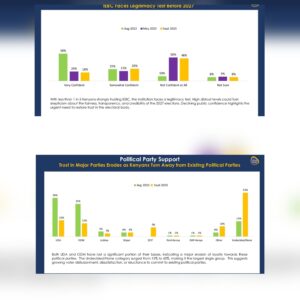Share
DrA new survey by Trends and Insights for Africa (TIFA) has revealed that confidence in the Independent Electoral and Boundaries Commission (IEBC) and trust in Kenya’s major political parties have dropped drastically, raising concerns about the credibility of the 2027 General Election.
According to the poll, released on September 24, 2025, only 18 percent of Kenyans said they were “very confident” in the IEBC, compared to 58 percent in August 2022.
The research firm warned that the dramatic fall in trust levels could undermine the electoral body’s ability to conduct free and fair elections.
“With less than 1 in 5 Kenyans strongly trusting IEBC, the institution faces a legitimacy test,” the report stated.
It added that “high distrust levels could fuel skepticism about the fairness, transparency, and credibility of the 2027 elections.”
The data shows a steady decline in confidence in the IEBC over the last three years.
Those describing themselves as “very confident” fell from 58 percent in August 2022 to 20 percent in May 2025 and further down to 18 percent in September 2025.
At the same time, the share of respondents who said they had “no confidence at all” rose from 10 percent in 2022 to 50 percent in May 2025 and now stands at 48 percent.
Fears Over Election Credibility
Although those “somewhat confident” in the commission increased marginally from 21 percent in May to 26 percent in September, the report emphasized that overall trust remains alarmingly low.
“Declining public confidence highlights the urgent need to restore trust in the electoral body,” TIFA said.
Political Party Support Declines
The survey also painted a bleak picture for Kenya’s political parties. Support for the two dominant outfits, United Democratic Alliance (UDA) and Orange Democratic Movement (ODM), has plummeted since the last election.
In August 2022, UDA commanded 38 percent support, but that figure has now fallen to 16 percent. ODM has suffered an even sharper decline, dropping from 32 percent to 13 percent over the same period.
“Both UDA and ODM have lost a significant portion of their bases, indicating a major erosion of loyalty towards these political parties,” the report noted.
Meanwhile, smaller parties have either stagnated or made only modest gains. Jubilee stands at 3 percent, down from 5 percent in 2022. Wiper has remained unchanged at 4 percent, while Ford-Kenya and DAP-Kenya continue to register just 1 percent each.
The Democratic Congress Party (DCP) has emerged as a notable gainer, doubling its support from 4 percent to 9 percent.
Disillusioned Voters on the Rise
However, the most striking trend is the surge in Kenyans unwilling to identify with any political party.
The “Undecided/None” category has ballooned from 15 percent in August 2022 to 43 percent in September 2025, making it the largest single group of respondents.
“This suggests growing voter disillusionment, dissatisfaction, or reluctance to commit to existing political parties,” TIFA explained.
The findings come at a critical moment, as the IEBC prepares for reforms and political parties strategize ahead of 2027.
Unless confidence in democratic institutions and political leadership is restored, Kenya could head into the next elections amid unprecedented levels of skepticism and disillusionment.

Report by TIFA on Voters Confidence of IEBC and Political Parties. PHOTO/ TIFA, Website.
You Might also Like








